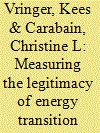|
|
|
Sort Order |
|
|
|
Items / Page
|
|
|
|
|
|
|
| Srl | Item |
| 1 |
ID:
177352


|
|
|
|
|
| Summary/Abstract |
Municipalities play an important role in the Dutch energy transition. However, it is unclear whether they have enough governing capacity to fulfil this role and thus can formulate and implement new policies successfully. The aim of this study is to assess how the performance of local policy on energy transition can be improved by improving governing capacity. To do so, we conducted a survey, operationalised governing capacity, and assessed relationships between governing capacity and policy output. We found that governing capacity, its preconditions and energy transition policy output differ largely between Dutch municipalities. We found no direct relationship between governing capacity and energy transition policy output. However, we established relationships between preconditions of governing capacity and policy output. Around 25% of the variance in policy performance can be explained by population size. If differences in other preconditions, referring to motivation of the administrative staff, participation of citizens and businesses, and inter-municipal cooperation, are also taken into account, 55%–59% of the total variance can be explained. To accelerate the local energy transition we recommend to improve governing capacity and its preconditions by stimulating the motivation of the local administrative staff, strengthening the cooperation between municipalities and seeking the participation of citizens and businesses.
|
|
|
|
|
|
|
|
|
|
|
|
|
|
|
|
| 2 |
ID:
171507


|
|
|
|
|
| Summary/Abstract |
In line with the Paris Agreement, the Dutch Government aims to achieve 49% CO2 emission reduction by 2030. The required energy transition will have a large impact on Dutch society. So, it is important that citizens and companies support and agree on the required policies. This paper explores the legitimacy of these policies and how to measure the degree of such legitimacy.
A survey among Dutch citizens and company representatives shows support for the emission reduction policy goals (input-legitimacy). We also explored support for two specific policy interventions (output legitimacy): 1) an ‘in-home display’, collectively paid for by all energy consumers, and 2) an in-home display that is paid for by the energy companies. Both interventions are supported by around 50% of the citizens and companies. We found strong correlations between underlying aspects of legitimacy (related to good governance criteria) and the overall support for the interventions. We also found that public support for a policy goal does not automatically result in support for the associated intervention. This emphasizes the importance of ex-ante testing of specific interventions to determine the level of public support, so that policy can become more effective and efficient.
|
|
|
|
|
|
|
|
|
|
|
|
|
|
|
|
| 3 |
ID:
150908


|
|
|
|
|
| Summary/Abstract |
The Dutch Government stimulates the application of energy efficiency measures to reduce the energy requirements of buildings, which are responsible for about 20% of the Dutch CO2 emissions. For our assessment, we followed a qualitative approach, due to a lack of data. We reviewed the mix of policy instruments and used stakeholder surveys and interviews. We found that energy use is not very likely to decline fast enough to achieve the Dutch policy targets for 2020. For new buildings, the policy mix works well, but its contribution to the policy targets is limited. For non-residential buildings the current Act, which obliges enterprises to take cost-effective measures, could be enforced to a greater degree. For privately owned homes a more compelling policy is needed. An alternative policy option would be to make taxation dependent on the energy label of residential houses. This would stimulate residents to take action while retaining the desired autonomy. For rental housing, binding agreements between municipalities and housing corporations may lead to more energy saving measures. Finally, we conclude that the Dutch energy tax is an important pillar of the current policy. It provides higher cost-effectiveness of energy saving measures and legitimates more strict energy efficiency standards.
|
|
|
|
|
|
|
|
|
|
|
|
|
|
|
|
|
|
|
|
|